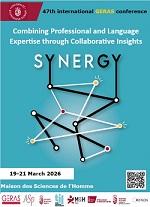
|
Combining Professional and Language Expertise through Collaborative Insights
19-21 Mar 2026 Dijon (France)
|
|
|
|
Call for papers47th GERAS International conference Université Bourgogne Europe, France
Synergy Combining Professional and Language Expertise through Collaborative Insights
Click here for the French version
English for Specific Purposes (ESP) serves a vital social role, functioning within a discursive framework shaped by interactions in professional and scientific communities (Swales, 2016). These communities are characterized by “a historically constructed, ongoing, conflicting, synergistic structuring of activity and relations among practitioners” (Lave & Wenger, 1991, p. 56). They generate and mobilize context-bound language practices, regulated by distinct norms across social, epistemic, and professional dimensions (Gotti & Dossena, 2001). Within these contexts, appropriate forms of professional and disciplinary identity are constructed and performed to achieve the pragmatic goals of both discursive and professional activity (Bhatia, 2015). Consequently, the language employed by such communities is not merely communicative but constitutive of institutional and professional action, positioning it as a fundamentally goal-oriented endeavor (Sarangi, 2004). The analysis and teaching of ESP has traditionally been dominated by a linguistic approach, sometimes leaving the expertise of professionals in the concerned field on the side line. Yet the latter plays a central role in the production and reception of specialist discourse, mastering not only the terminology but also the conceptual and methodological framework of their discipline. Candlin et al. (2002) argue that understanding a community requires a shift from purely linguistic descriptions of genres to a broader exploration of the social and cultural contexts. Closer collaboration between language experts and domain experts is therefore essential to ensure a more integrated and relevant approach to ESP, considering both discourse and professional requirements (Belcher, 2009). This synergy between language experts and domain experts makes it possible to develop tools adapted to the different objectives of ESP in its research and teaching/learning dimensions, so as to better prepare learners for the challenges of specialist communication and professional practice in a globalized world (Hyland, 2000). However, the scientific literature on these issues remains limited. This may be due to time and resource constraints: domain experts are often faced with professional imperatives that limit their availability for exchanges with researchers and teachers of the language. Also, the lack of data on these practices indicates that collaboration between language and domain experts is often informal and takes place outside systematic frameworks, making it difficult to analyze its effectiveness. Against this backdrop, this conference proposes to examine the ways in which language and domain experts work together, exploring how this disciplinary articulation can enrich research into English for Specific Purposes, as well as its teaching/learning. The aim will be to examine the theoretical and methodological frameworks that encourage interdisciplinary cooperation, to identify the challenges and issues associated with this interaction, and to suggest ways in which the needs of specialist discourse communities can be better taken into account. The collaboration between language experts and domain experts could be studied through the following questions, without being limited to them:
Didactic and teaching strategies: Who are the experts involved in this collaboration? What methodologies could be used to optimize the synergy between these two types of experts in the design of teaching material? Cultural dimension: Are there specialist areas whose visibility is lower than that of other areas, and what are the reasons for this? What strategies can be implemented to co-construct learning situations that reinforce learners’ practical skills in an international and intercultural context? Is FASP (Fiction à Substrat Professionnel) a relevant means of facilitating access to an understanding of the cultures and specificities of specialist fields? How can cultures from specialized fields be apprehended ? What humanities methodologies can be applied here? Linguistic approach: How does the analysis of specialized discourse and/or the analysis of discourse genres provide an in-depth understanding of specialized domains? Is the terminology of specialized domains the result of a unidirectional construction or is it a co-constructed process? To what extent can domain experts contribute to the creation of specialized corpora? Is the ethnographic study of specialist fields a widespread practice in the work of linguists? Technological tools: What technologies can foster optimal collaboration between the domain expert and the language expert? What are the prospects for specialized translation in the age of artificial intelligence? Is technological collaboration limited solely to language experts and experts in specialized fields? What forms of collaboration underpin the development and use of e-learning platforms? Proposals in French or in English (300 words, 5 keywords, with a maximum of 10 bibliographical references) on this theme or related subjects must be submitted on the dedicated Scienceconf webpage (https://geras2026.sciencesconf.org) before 14 December 2025.
Bibliographical references Belcher, Diane. 2009. “English for Specific Purposes: Teaching to Perceived Needs and the Realities of Practice.” In The Handbook of Language Teaching, edited by Michael H. Long and Catherine J. Doughty, 742–758. Oxford: Blackwell. Bhatia, Vijay K. 2015. “Critical Genre Analysis: Theoretical Preliminaries.” HERMES - Journal of Language and Communication in Business 54: 11–25. https://doi.org/10.7146/hjlcb.v0i54.21198. Candlin, Christopher, Vijay Bhatia, and Christopher Jensen. 2002. “Must the Worlds Collide? Professional and Academic Discourses in the Study and Practice of Law.” In Domain-Specific English: Textual Practices across Communities and Classrooms, edited by Giuseppina Cortese and Philip Riley, 101–114. Linguistic Insights 2. Bern: Peter Lang. Gotti, Maurizio, and Marina Dossena. 2001. Genre and Discourse: A Genre-Based Approach to Professional Communication. Bern: Peter Lang. Hyland, Ken. 2000. Disciplinary Discourses: Social Interactions in Academic Writing. Harlow: Longman. Lave, Jean, and Etienne Wenger. 1991. Situated Learning: Legitimate Peripheral Participation. Cambridge: Cambridge University Press. Sarangi, Srikant. 2004. “Language/Activity: Observing and Interpreting Ritualized Institutional Discourse.” In Cahiers de linguistique française, vol. 26, edited by Laurent Filliettaz, 135–150. Geneva: Department of Linguistics, University of Geneva. Swales, John. 2016. “Reflections on the Concept of Discourse Community.” ASp La revue du GERAS, 69. https://doi.org/10.4000/asp.4774.
|

